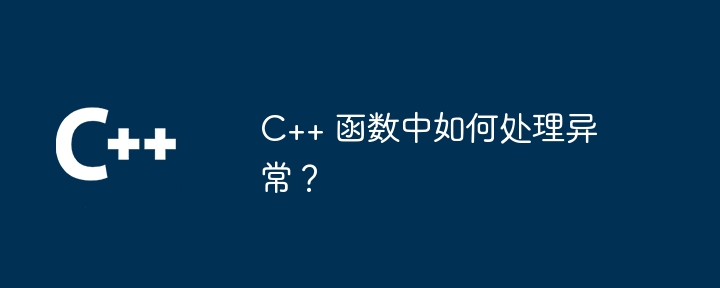
In C, exceptions are handled through the try-catch statement: the code in the try block may throw an exception. The catch block catches standard exceptions or custom exceptions. The noexcept keyword declares that the function will not throw exceptions for optimization.

#How to handle exceptions in C functions?
In C, exceptions are handled through the try-catch statement, which includes three main parts:
try {
// 代码块,可能抛出异常
}
catch (const std::exception& e) {
// 捕获标准异常
}
catch (const MyCustomException& e) {
// 捕获自定义异常
}Practical case:
Suppose we have a function divide that calculates the quotient of two numbers, but throws an exception when the denominator is 0:
int divide(int num, int denom) {
try {
if (denom == 0) {
throw std::runtime_error("除数不能为 0");
}
return num / denom;
}
catch (const std::exception& e) {
std::cout << "错误: " << e.what() << std::endl;
}
}In the main function, we can Call the divide function and catch the exception:
int main() {
try {
int dividend = 10;
int divisor = 0;
int result = divide(dividend, divisor);
std::cout << dividend << " / " << divisor << " = " << result << std::endl;
}
catch (const std::runtime_error& e) {
std::cout << e.what() << std::endl;
}
}Output:
错误: 除数不能为 0
Note:
std::exception. noexcept keyword to declare that the function will not throw exceptions for optimization. The above is the detailed content of How to handle exceptions in C++ functions?. For more information, please follow other related articles on the PHP Chinese website!
 What are the differences between c++ and c language
What are the differences between c++ and c language
 Recommended learning order for c++ and python
Recommended learning order for c++ and python
 Cost-effectiveness analysis of learning python and c++
Cost-effectiveness analysis of learning python and c++
 Is c language the same as c++?
Is c language the same as c++?
 Which is better to learn first, c language or c++?
Which is better to learn first, c language or c++?
 The difference and connection between c language and c++
The difference and connection between c language and c++
 C++ software Chinese change tutorial
C++ software Chinese change tutorial
 Cost-effectiveness analysis of learning python, java and c++
Cost-effectiveness analysis of learning python, java and c++




